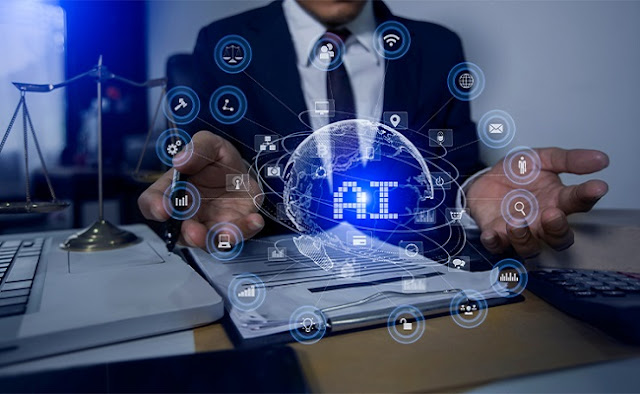Welcome to the groundbreaking world of Artificial Intelligence (AI), where technology meets law and creates innovative solutions to reshape the way legal business strategies are implemented.
AI,
in its essence, acts as a virtual assistant equipped with the power to
transform and enhance decision-making processes within the legal field. In this
blog, we will talk about the rise of AI technology in the legal industry. Also,
we will shed light on the advantages, challenges, considerations, and the
future of AI in the legal world.
The Rise of AI in the Legal Industry
At
its core, AI is a marvel of technology, mimicking human-like thinking processes
to analyze vast amounts of data swiftly and efficiently. This digital
intelligence, resembling a highly intelligent robot, plays a pivotal role in
revolutionizing legal operations by expediting tasks that would traditionally
consume a significant amount of time.
Visualize
AI as a legal assistant capable of deciphering complex legal documents and
facilitating comprehensive research. It goes beyond mere automation, actively
managing and organizing an extensive array of paperwork, ensuring a systematic
and streamlined approach to legal work.
Top 3 Advantages of AI in the Legal Sector
1. Efficiency and Time-Saving
The
superheroic efficiency of AI enables legal professionals to accomplish tasks at
unprecedented speeds. Mundane and time-consuming assignments that once burdened
legal professionals are now completed swiftly, affording them more time for
critical thinking and strategic decision-making.
2. Improved Accuracy
AI
serves as a meticulous proofreader, significantly reducing the margin of error
in legal work. Precision holds immense significance in the legal sector, where
even minor errors can have substantial consequences. AI serves as a dependable
ally, guaranteeing accuracy and reducing the risk of mistakes.
3. Cost-Effectiveness
The
cost-effectiveness of AI is akin to having a tireless assistant who works
tirelessly without the need for compensation. By efficiently handling tasks
that would otherwise demand considerable human resources, AI becomes an
invaluable asset, offering substantial financial savings for law firms and
businesses.
Common Challenges and Considerations
- Ethical
Considerations: Like any potent tool, ethical
considerations are of utmost importance. The responsible deployment of AI is
essential to avoid unintended consequences. Legal and ethical frameworks must
be established to govern the fair and just application of AI within the legal
sphere.
- Integration
Challenges: Introducing AI into existing workflows is akin to
introducing a new member to a team. There may be challenges in harmonizing the
efforts of AI with human counterparts, necessitating careful consideration of
the most effective and seamless integration strategies.
To understand these challenges better, let's look at some real-life examples:
- Ethical
Dilemmas: Consider a situation where an AI system, if not
properly guided, might make decisions that unintentionally favor one side over
another in a legal case. Ethical guidelines would be crucial to prevent any
biases or unfairness.
- Integration
Hiccups: Think of a law firm introducing a new AI system for
document management. The challenge may lie in ensuring that the AI smoothly
integrates with the existing processes and that all team members understand how
to use it effectively.
The Future of AI in the Legal Industry
AI,
or Artificial Intelligence, is like a super-smart assistant changing how the
law works. It helps lawyers do things faster and more accurately. Think of it
as a helpful robot making legal tasks easier.
In personal
injury law (dealing with accidents or injuries), AI
is like a superhero. It speeds up tasks, stops mistakes, and saves money for
law firms. But, we need to be careful to use AI fairly and fit it into our
current legal ways.
Looking
ahead, AI will work even better with legal pros. It'll help understand human
language better, predict legal outcomes, and help in a more personalized way. In
the future, courtrooms might use AI to make things quicker and safer.
Emerging Trends
Advanced Natural Language Processing
(NLP): AI is enhancing its capacity to understand and respond
to human language. This signifies that legal experts can engage with AI systems
in a more natural manner, enhancing the intuitiveness of communication and
information retrieval.
- Predictive
Analytics: AI is becoming adept at predicting outcomes based on
historical data. In the legal context, this could mean forecasting legal
trends, case outcomes, or potential challenges, aiding lawyers in making more
informed decisions.
- Increased
Collaboration between AI and Legal Professionals: The
future sees a more seamless collaboration between AI systems and legal experts.
AI tools will not replace human expertise but will complement it, working
together to achieve more effective and accurate results.
- Enhanced
Data Security Measures: As AI becomes integral to legal processes,
ensuring robust data security measures will be a top priority. Developments in
encryption and cybersecurity will be pivotal in ensuring the protection of
confidential legal data.
- Customized
AI Solutions for Legal Firms: The future will witness the development of
AI solutions tailored specifically for legal practices. These customized tools
will address the unique needs and challenges faced by legal professionals,
enhancing overall efficiency.
- Expanded
Use of AI in Legal Research: AI will continue to play a significant
role in legal research with improved algorithms and data analysis capabilities.
This will enable faster and more comprehensive information retrieval,
empowering legal professionals with valuable insights.
- Integration
of AI in Courtrooms: The future may see AI being utilized
within courtrooms to streamline processes, manage caseloads, and provide quick
access to relevant legal information. This has the potential to result in more
efficient and organized legal proceedings.
Conclusion
AI emerges as a wizard's wand within the legal domain, wielding transformative powers that redefine the landscape of legal business strategies. With its capacity to enhance efficiency, ensure accuracy, and open new frontiers of possibility, AI is not merely a tool but a catalyst for a new era in the legal profession. As we continue to unlock the potential of AI, the journey promises to be a fascinating exploration into the realms of technology, innovation, and legal prowess.
